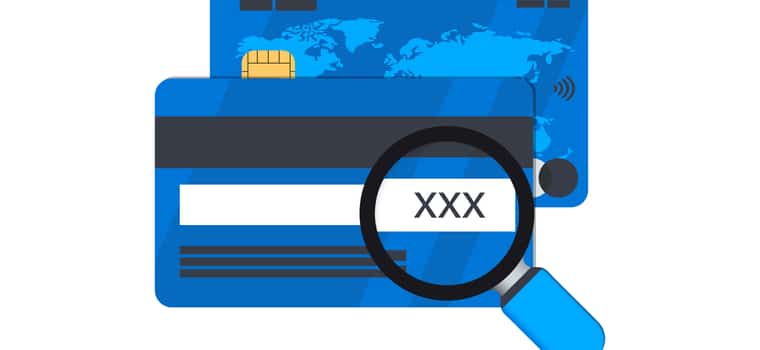When you make an online purchase, you’ve probably noticed that you’re usually required to enter your Card Verification Value (CVV) number along with your credit card number and expiration date. If you’re like most people, you’re probably not exactly sure what a CVV is. To put it simply, your CVV is a 3- or 4- digit security code provided with your credit card to help protect you against fraud. This number can’t be stored by merchants, so it’s an extra layer of protection against unlawful usage. You might also hear this code referred to as a CSC (card security code) or CVV2.
What’s the Purpose of the CVV?
The CVV is a security code on the credit card to help protect cardholders against fraud. Unlike your card number, merchants are not able to store the CVV in their database. Even during a database breach, hackers aren’t able to obtain this number so it’s meant to prove that you’re actually in possession of the card. Subscription service websites like Spotify and Netflix only use the CVV one time to authenticate the card and don’t require it on recurring charges.
When credit card thieves don’t know your CVV number, they won’t be able to use your credit card to make most purchases. However, businesses aren’t required to ask for your CVV when processing a payment, and many don’t. So the CVV can’t protect you everywhere.
In addition, phishing sites set up to steal your information will request your CVV too. These websites are often constructed with enough care to look like legitimate retailers and are a common way for thieves to steal your card information.
So while the CVV is an extra layer of protection, it isn’t a foolproof way to prevent theft.
Where to Find the CVV on Your Credit Card
The CVV number is located on the physical card. Much like the credit card number and expiration date, this means that you have to have the card in-hand, or have written the numbers down, to provide this number. We highly recommend that you never write down sensitive information like this, as security measures are in place to ensure that only the person in possession of the card can make purchases (especially online).
The location can differ depending on the lender:
- For credit cards issued by Visa, MasterCard, and Discover, you’ll find your card’s CVV on the back beside the signature box.
- On American Express cards, you’ll find the 4 digits printed on the front above your card number.
No matter which type of card you have, CVVs are always printed on the card itself, not embossed like the card number itself.
Tips for Keeping Your CVV and Credit Card Information Safe
Credit card companies are continuously developing new technologies to keep your information safe, but it’s important to do your part in preventing theft. These tips can help you keep your credit card information safe:
- Only shop with merchants you trust: Remember, if it’s too good to be true, it probably is. Only make purchases with merchants you trust – if you’re ever unsure, take a few minutes to research the company before handing over your payment information. If they ask for your CVV, do your homework.
- Use a virtual credit card: Many credit card companies are able to provide you with a one-time-use credit card number, which can go a long way in keeping your information safe when making online purchases.
- Never use your CVV as your PIN: Your PIN should always be a unique number separate from your CVV. And you should never write your pin anywhere on your card.
- Avoid saving your information on merchant websites: Having your card information saved on sites where you frequently shop may be convenient for future transactions, but it leaves you more exposed to having your information stolen. It’s best to type it in each time.
- Only provide payment information to encrypted sites with a secure tag: Before entering payment information, make sure the website URL begins with “HTTPS.” The “s” indicates that the website is encrypted to keep your information safe. Many web browsers, like Chrome, also display a lock beside the URL to indicate a secure site.
Always monitor your credit card statements and your credit report for suspicious activity if you lose or have your physical credit card stolen. Cancel the card immediately, because with that card anyone can make a purchase–they have the card number, expiration date, and CVV. Products like ScoreSense can help make monitoring your credit report easy.
Protect Your CVV and Your Credit
Understanding exactly what a CVV number is can help you prevent fraud and identity theft. While it’s an added layer of security, it’s always important to stay vigilant and take precautions to keep your information protected.




